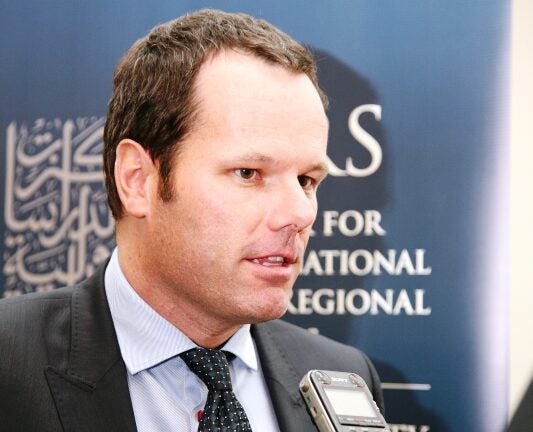Dialogue Series, Environmental Studies, Regional Studies
Arab Food, Water, and the Big Gulf Land-Grab that Wasn't

On November 14, 2011, Eckart Woertz, Visiting Fellow at Princeton University, delivered a CIRS Monthly Dialogue lecture titled, “Arab Food, Water, and the Big Gulf Land-Grab that Wasn’t.” Woertz placed the question of food security within a historical and cultural context. Food, he said, has historically been a highly politicized commodity and has been subject to political maneuvering regardless of the actual resources of food available. He argued that “with rising import needs, the GCC faces increasing problems,” and so food security is important for the political legitimacy of any government in its ability to satisfy social needs now and in the future.
Historic experience shows that countries have always been dependent on imports of one kind or another and are, as such, always susceptible to any fluctuation in energy or food supplies. This relationship of interdependence where countries find themselves vulnerable within the global matrix is capitalized upon by regional and international power politics.
The availability of food is considered a basic human right that all governments must provide their populaces. In the rentier arrangement of Gulf countries, the ruling elite are particularly susceptible to criticism and social unrest if social welfare is not maintained. The food price hikes and export restrictions by food exporters like Russia, India, and Vietnam caused wide-spread panic in 2008 all around the world. This prompted Middle East countries, and Gulf states in particular, to become increasingly aware of their vulnerabilities in relation to issues of food security. In order to address the growing problem, several Gulf states have invested in various agricultural enterprises, both domestically and abroad.
Many of the domestic food security projects are not environmentally or economically rational endeavors. For example, Woertz explained how Saudi Arabia, despite water shortages and harsh desert conditions, became a wheat grower and exporter in the 1990s, placing heavy demands on already strained water supplies. Currently, Saudi has one of the largest dairy farms in the world and imports large amounts of sheep. In order to properly sustain this livestock industry, Saudi has become one of the largest importers of barley.
On the international level, many GCC governments have announced foreign land acquisitions, known to critics as “land-grabs,” mainly in nearby Sudan, but also in countries as far away as Brazil and Australia. The bulk of these land acquisitions usually take place in the poorer third world countries and so many question whether human and land rights are respected and whether international laws are being properly enforced. In the 1980s, Gulf countries wanted to develop farmlands in Sudan to serve as a “Bread Basket” to feed populations back home, but this scheme was terminated due to various problems, among them corrupt governance during the Nimeiri regime.
The discourse of food security is prone to high levels of fear-mongering. Woertz recounted the health problems that exist in the Gulf and that are caused by bad dietary habits. He explained that high levels of obesity and diabetes are generally a sign that “Gulf countries are food secure. If there’s a problem, it’s with too much food, not too little,” he said.
Eckart Woertz was former Director of Economic Studies at the Gulf Research Center in Dubai and held senior positions in financial services companies in Germany and the UAE. He is currently finishing a book about Middle East food security and has published widely on financial markets and economic development in the Gulf and is a well-known commentator for international media outlets. He holds a PhD in economics from Friedrich-Alexander University of Erlangen-Nuremberg.
Article by Suzi Mirgani, CIRS Publications Coordinator